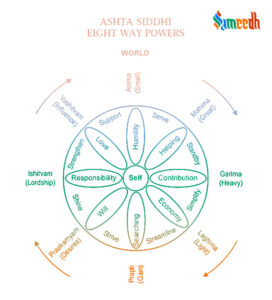“Praakamyam Siddhi” emphasizes the potential for individuals to manifest their desires or intentions through spiritual practice and mastery of consciousness. The ability to manifest anything by will. However, it’s essential to approach such concepts with discernment and humility, recognizing that the ultimate aim of spiritual practice is often seen as transcending desires and ego identification rather than fulfilling personal wishes..

Siddhis are frequently mentioned in various Hindu scriptures, including the Yoga Sutras of Patanjali, the Bhagavad Gita, and various Purans. The concept of “Prakamya Siddhi” is not widely recognized within traditional Hindu scriptures or philosophical texts. However, based on the term itself, “Prakamya” meaning desires or wishes, and “Siddhi” referring to attainment or accomplishment, one might infer its meaning as the attainment or fulfillment of desires.
In a broader spiritual context, the pursuit of desires or wishes is often viewed as an obstacle to spiritual growth, as attachment to desires can bind individuals to the cycle of birth and rebirth (samsar). Therefore, the concept of “Prakamya Siddhi” could potentially refer to a state where one’s desires are transcended or fulfilled in a manner that leads to spiritual liberation (moksh).
It’s worth noting that while the term “Prakamya Siddhi” may not be explicitly mentioned in classical Hindu scriptures, the theme of desire, fulfillment, and liberation is central to various spiritual teachings. Many spiritual traditions emphasize the importance of overcoming desires and cultivating inner contentment and detachment as a means to attain higher states of consciousness and ultimately liberation from the cycle of reincarnation.
While many spiritual traditions advocate for detachment from material desires, the concept of “Prakamya Siddhi” acknowledges the importance of desires in human life. It suggests that desires need not be renounced but rather transformed and directed towards spiritual realization. This integration allows individuals to pursue both material and spiritual goals without conflict, as long as they are in harmony with higher spiritual principles.
By fulfilling desires in alignment with spiritual principles, individuals can progress on the path towards liberation (moksh). “Prakamya Siddhi” implies that desires fulfilled through spiritual practice lead to inner contentment and detachment, paving the way for liberation from the cycle of reincarnation.
The fulfillment of desires through “Prakamya Siddhi” is not solely for personal gain but also for the benefit of others. Spiritual aspirants who attain this Siddhi often use their abilities to serve humanity and alleviate suffering, embodying the principles of compassion and selflessness.
In some interpretations, “Prakamya Siddhi” is considered an expression of the divine will working through the individual. By aligning one’s desires with the divine purpose, individuals can manifest positive outcomes in their lives and contribute to the greater good.
The concept of “Prakamya Siddhi,” which specifically emphasizes the ability to fulfill desires or wishes through supernatural or spiritual means, is not commonly associated with specific individuals in Hindu mythology or scriptures. However, there are numerous stories that involve the fulfillment of desires through divine intervention, devotion, or the blessings of gods and goddesses. Here are a few examples:
- King Harishchandra: In Hindu mythology, King Harishchandra is known for his unwavering truthfulness and devotion to duty. When faced with severe trials and tribulations, including the loss of his kingdom, family, and even his own identity, Harishchandra remained steadfast in his commitment to truth and righteousness. Eventually, his devotion and adherence to dharm led to the restoration of his kingdom and the fulfillment of his desires.
- Draupadi’s Vastraharan (Disrobing) Incident: During the gambling match in the Mahabharat, Draupadi, the wife of the Pandavs, was humiliated and disrobed in the royal court by Duryodhana and his brothers. In her moment of distress, Draupadi fervently prayed to Lord Krushna for help. Krushna intervened miraculously, providing her with an endless stream of garments, thus fulfilling her desire for protection and dignity.
- Savitri and Satyavan: In the Mahabharat, the story of Savitri and Satyavan illustrates the power of love and devotion. Savitri, a devoted wife, embarks on a quest to save her husband Satyavan from the clutches of death. Through her unwavering devotion and cleverness, Savitri convinces Yam: the god of death, to spare Satyavan’s life and fulfill her desire to live with her husband.
- Sudama’s Meeting with Lord Krushna: Sudama, a poor Brahmin and childhood friend of Lord Krushna, visited Krushna seeking help to alleviate his poverty. Despite his reluctance to ask for assistance, Sudama carried a humble gift of beaten rice to offer to Krushna. Touched by Sudama’s devotion and love, Krishna blessed him with wealth and prosperity, fulfilling Sudama’s desires without him having to explicitly ask.
- Vibhishan’s Surrender to Lord Ram: Vibhishan, the younger brother of the demon king Ravan in the Ramayan, desired to live a righteous life and serve the cause of dharm. Despite being part of Ravan’s kingdom, Vibhishan surrendered to Lord Ram, seeking refuge and offering his allegiance. Lord Ram accepted Vibhishan’s surrender and fulfilled his desire to serve the divine cause.
These stories highlight the power of devotion, righteousness, and divine grace in the fulfillment of desires, showcasing the theme of “Prakamya Siddhi” in Hindu mythology and tradition.
Overall, the significance of “Prakamya Siddhi” lies in its potential to harmonize material desires with spiritual aspirations, leading individuals towards fulfillment, inner peace, and ultimately liberation. It emphasizes the transformative power of desires when guided by spiritual wisdom and devotion to higher principles.
In summary, while “Prakamya Siddhi” may not have a specific and widely recognized definition within Hindu philosophy, one can interpret it as the attainment of desires in a way that leads to spiritual growth and liberaon.